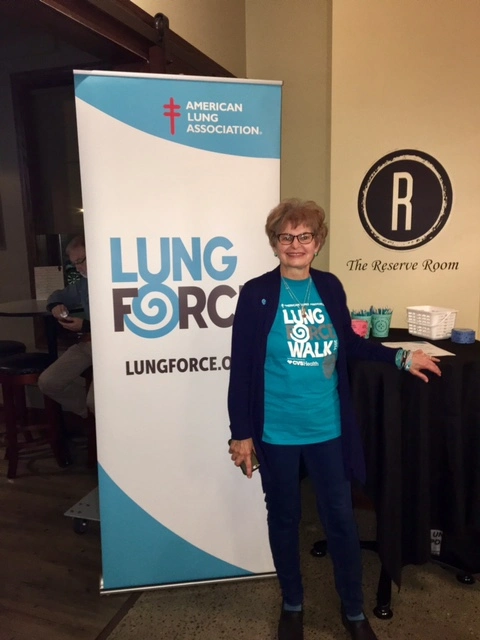
Anita F.
In June 2014, I was diagnosed with stage IV adenocarcinoma of the lung, a dire diagnosis with grim survival statistics. I am feeling good and doing well today due to the rapid advances in personalized treatment of cancer.
I've been fortunate in receiving good, up-to-date medical care from the beginning. I started with a local oncologist at a community cancer center. She knows about the importance of a genomic analysis for my type of cancer, and we got that done. This analysis revealed a mutation in my cancer, EGFR exon 19 deletion, so my first line of treatment was Tarceva, a targeted therapy taken as a once per day pill. As I adjusted to treatment, I found the strength to begin learning about my disease and current research through the Internet. I became an e-patient, engaged in my own treatment. As my first line of therapy began to fail, I found a clinical trial and enrolled. I'm currently in a phase 2 study of CO-1686 (Rociletinib) and doing well. I have my eye on treatment options to move to when my current drug no longer is effective. I live in hope that I will be able to continue to extend my life with a good quality of life.
Lung cancer appears to be on the rise in healthy people with no smoking history, especially among women - I know many such patients through online communities. I myself am an ex-smoker, quitting for good in 1981. The type of cancer I have is not generally associated with a smoking history, but who knows if the first genetic change in an errant cell in my lung was caused by exposure to smoke. Whether a patient smoked or not, I believe that no one deserves to suffer with lung cancer. We need more research, better screening technologies, and both more and better treatments, and we also need better education of both doctors and patients about early warning symptoms. This is why I support Lung Force, because of its efforts to educate, reduce stigma, support research, and advocate for lung cancer patients.
My focus is on living with my cancer for as long as I can, again with good quality of life. I believe that current advances in knowledge, mostly stemming from the human genome project, mean that cure may be possible in the future. I don't know if I will be able to be cured, but someday people like me will be. In the meantime, I am grateful to be able to manage my cancer as a chronic illness and to be part of the movement towards greater knowledge through participation in a clinical trial. I won't hesitate to sign up again if another good possibility becomes available. I am also sharing my experiences and thoughts through social media, including a blog.
My family is engaged with lung cancer in another way that makes me very proud. Our daughter recently completed her PhD in statistics, and she is currently working as a postdoctoral fellow. She is working on several different projects in the area of cancer genetics and epidemiology, and one of those studies is a large lung cancer study.
One last part of my story: I have been very, very fortunate to be financially stable through this illness. I was 62 when diagnosed, so was able to retire. Between SSDI, a pension, and excellent health insurance, my husband and I are comfortable. Many people cannot say the same. I have heard heartbreaking stories of financial ruin. We need more research, we need more treatments, and we need a more robust safety net for people who struggle with this kind of illness.
First Published: April 6, 2022
A Breath of Fresh Air in Your Inbox
Join over 700,000 people who receive the latest news about lung health, including research, lung disease, air quality, quitting tobacco, inspiring stories and more!
Thank You!
You will now receive email updates from the American Lung Association.

